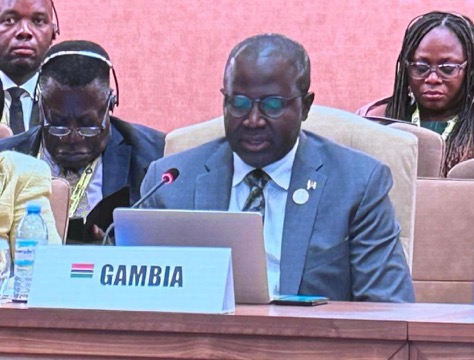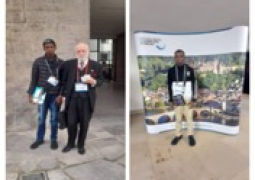
Speaking at the 19th Ministerial Meeting of Non-Aligned Movement Countries in Kampala, Uganda, Lang Yabou appealed for the need for member countries to further deepen cooperation through the pursuit of more win-win partnerships, solidarity and collaboration.
The former Gambian ambassador to the Kingdom of Spain and to the United Nations in New York, said developing countries like The Gambia continue to face challenges that are compromising post-pandemic recovery efforts, including factors relating to climate change, financing for development and debt sustainability.
“At the current pace of implementation, the attainment of the goals of Agenda 2030 for Sustainable Development is under serious threat. With barely seven years to go, there is a very urgent need to recalibrate our commitments toward the timely achievement of the Sustainable Development Goals,” he said.
“Shared global affluence is a goal that can be achieved if we take up our global commitments more seriously by rebuilding the lost trust within the international community,” PS Yabou said. “Too many development blueprints, too many unfulfilled commitments, inadequate international solidarity, deep international mistrust and polarisation are all negatively impacting our cooperation mechanisms and multilateralism in general.”
He urged countries to reinvest in the revival of multilateralism and global partnership systems since no country can go it alone when it comes to dealing with climate change, underdevelopment migration, pandemic preparedness and response, cybersecurity, disarmament, terrorism and conflict resolution.
“The theme that you have chosen for our summit is both relevant and timely considering the ongoing existential threats and current geopolitical realities that are testing the resilience of our societies, the cohesiveness of our global response systems and the very existence of our specie as one human family.”
Therefore, “deepening cooperation for shared global affluence” is one of the elements at the core of our multilateral system. There is no better time to rekindle international cooperation and solidarity than now to tackle our common global challenges.
“We do not only need to cooperate more, but such cooperation must be on a global scale, and deepened at the global level for our collective prosperity. The Sustainable Development Goals (SDGs) were designed to deliver prosperity for all member states through strong institutions, cooperation, global solidarity and partnership. With renewed vigor, the international community, including the International Financial Institutions (IFIs) must accelerate the implementation of the goals with critical financing for development.”
“Most of our members are from the Global South facing unique challenges in terms of making their voices heard on the global stage. Our movement must continue to champion their causes by amplifying the voice of the Global South at all global and relevant spaces. NAM must continue to always speak with a unified voice. We are stronger together and we must not be distracted by attempts to divide our cause.
“Fighting for an equitable and just world order in which our collective concerns receive equal and just treatment is still a worthy cause, and a lofty ideal, we must aspire to. There are far too many devastating conflicts raging around the world today. We cannot ignore them or remain amoral about them.
“With its strong commitment to the promotion and protection of international peace and security demonstrated by its action of being a police and troop contributing country to UN, AU and ECOWAS peace keeping missions around the world, The Gambia is today concerned by the alarming nature of conflicts in the world and it is our position that, we must collectively act together to bring about lasting peace in Palestine,” he posited.
“The world is in need of peace makers and peacebuilders and it cannot be business as usual seeing the threats facing all of us. NAM must therefore, continue to launch initiatives to support conflict resolution through the just application of international law, norms and standards within the collective security arrangements that we have created.
Read Other Articles In Headlines




